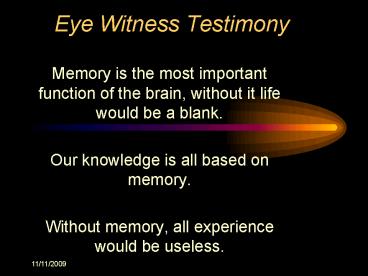Eye Witness Testimony - PowerPoint PPT Presentation
1 / 29
Title: Eye Witness Testimony
1
Eye Witness Testimony
- Memory is the most important function of the
brain, without it life would be a blank. - Our knowledge is all based on memory.
- Without memory, all experience would be useless.
2
Eye Witness Testimony
- Involves memory
- The study of human memory is a research area in
COGNITIVE PSYCHOLOGY
3
How reliable is your MEMORY?
- Class activities!
- Write down your earliest memory
- Write down your most memorable time.
- Why do you think you remembered these incidents?
4
How reliable is your MEMORY?
- How reliable WERE your memories?
- What problems do we have in remembering?
5
EYE WITNESS TESTIMONY?
- Loftus Palmer
- Loftus is a WOMAN (Elizabeth)
- THEY TESTED
- The reliability of eye witness testimony
- The effect of leading questions
6
LOFTUS PALMER
- What is a leading question ?
- Have you seen the book? (leading Q)
- Have you seen a book?(not leading Q)
- Can you give examples which could confuse an
eyewitness? - Memory is NOT like a camera - we always
reconstruct our memories
7
LOFTUS PALMER (1974)
- The title of their paper was
- The reconstruction of an automobile destruction
- Their research involved TWO experiments
8
LOFTUS PALMER Experiment 1
- The participants - 45 students
- The procedure - Students watched film clips of
car accidents - After watching the films the students were asked
to do TWO things
9
LOFTUS PALMER Experiment 1
- 1 Write an account of what they had seen.
- 2 Answer questions about what they had seen.
- One question was the CRITICAL QUESTION (leading
question)
10
LOFTUS PALMER Experiment 1
- THE CRITICAL QUESTION
- About how fast were the cars going when they
() each other? - Think of words which would change the memory.
- There were five conditions (verbs) in the
experiment - (Five groups of students)
11
LOFTUS PALMER Experiment 1
- The five conditions (verbs) were
- CONTACTED
- HIT
- BUMPED
- SMASHED
- COLLIDED
12
The Results
13
LOFTUS PALMER Experiment 1
- What conclusion can you draw from the results?
- What was the IV?
- WAS THE CRITICAL QUESTION
- What was the DV?
- WAS THE ESTIMATED SPEED
14
Problems
Could it be that the actual speeds influenced the
eyewitness? The films were staged and the speeds
were accurately measured. 20 mph estimated at
37.7 mph 30 mph estimated at 36.2 mph 2 films of
40 mph estimated at 39.7 and 36.1
15
EYE WITNESS TESTIMONY
- The second experiment by Loftus Palmer.
- They wanted to see how the verb would change the
memory representation. - e.g If the cars smashed. What would be the
memory? - Likely that there would be memory of broken glass
16
LOFTUS PALMER - Experiment 2
- The participants - 150 students
- The procedure
- Students watched a one minute film which showed
a second multiple car accident.
17
LOFTUS PALMER - Experiment 2
- After the film the participants were divided into
- THREE EXPERIMENTAL GROUPS
18
LOFTUS PALMER - Experiment 2
- GROUP 1 was asked
- How fast were the cars going when they
- HIT each other?
19
LOFTUS PALMER - Experiment 2
- GROUP 2 was asked
- How fast were the cars going when they
- SMASHED INTO each other?
- This was the critical question
20
LOFTUS PALMER - Experiment 2
- GROUP 3 was asked
- NO QUESTION about the speed of the cars
21
LOFTUS PALMER - Experiment 2
- ONE WEEK LATER
- The participants returned and were asked more
questions - Including the critical question
22
LOFTUS PALMER - Experiment 2
- THE CRITICAL QUESTION
- Did you see any broken glass?
23
LOFTUS PALMER - Experiment 2
Did you see any broken glass?
- The critical question twice as likely to see
broken glass.
24
LOFTUS PALMER - Experiment 2
- What was the DV in the second experiment?
- The answers of the participants. Whether they saw
broken glass or not
25
LOFTUS PALMER - Experiment 2
- What conclusion can you draw from the results?
- The uncertainty of eyewitness testimony
- The use of reconstructive memory. Memory which
is used to make meaning.
26
LOFTUS PALMER
- Was this research in any way unethical?
- Does the research have ECOLOGICAL validity
27
LOFTUS PALMER
- Was this a repeated measures design?
- OR
- An independent measures design?
28
LOFTUS PALMER
- A repeated measures design
- An experiment in which the same subjects are
assigned to each group - An independent measures design
- An experiment in which the subject only
experiences one condition of the IV
29
LOFTUS PALMER
- Read the KEY STUDY about human memory
- Do you think that UNSUPPORTED EYE WITNESS
TESTIMONY should be sufficient evidence upon
which to convict someone?

